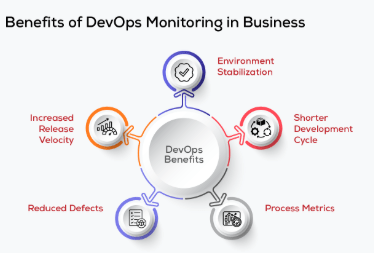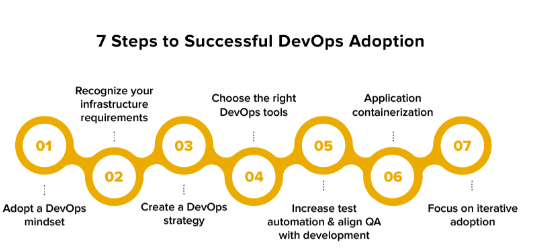
- Introduction to DevOps in Business
- Faster Software Delivery with DevOps
- Improved Collaboration Between Teams
- Enhanced Security and Compliance
- Scalability and Infrastructure Automation
- Cost Reduction and Resource Optimization
- Continuous Monitoring and Feedback Loops
- Increased Customer Satisfaction
- Role of Cloud Computing in DevOps Adoption
- DevOps Success Stories from Industry Leaders
- Conclusion: The Future of DevOps
Introduction to DevOps in Business
DevOps has emerged as a key methodology for software development and operations in the modern business landscape, where speed, efficiency, and customer satisfaction are paramount. DevOps (a combination of “Development” and “Operations”) is a cultural and technical movement aimed at improving collaboration, communication, and integration between development and operations teams. DevOpsTraining approach enables businesses to deliver software faster, reliably, and securely by integrating Continuous Delivery development, testing, deployment, and monitoring. The traditional software development process often involved siloed teams of developers focusing on writing code and operations teams managing Infrastructure Automation. These silos created delays, bottlenecks, and inefficiencies, hindering an azure devops organization ability to respond quickly to market demands. DevOps breaks down these barriers and encourages collaboration across the entire software lifecycle, resulting in faster, more efficient, and high-quality software delivery. As businesses increasingly rely on technology to deliver products and services, adopting DevOps is becoming more crucial in achieving a competitive edge. Companies that successfully implement DevOps see tangible benefits across various areas, including faster software delivery, improved collaboration, and greater customer satisfaction.
Faster Software Delivery with DevOps
One of the primary advantages of adopting DevOps is the ability to accelerate software delivery.azure devops organization to automate many aspects of the development lifecycle, including code testing, integration, and deployment. DevOps Career Path release cycles allowed by DevOps ensure that products can be delivered faster, enhancing business agility and responsiveness.
- Continuous Integration (CI): Developers frequently commit changes to a shared repository, which are automatically tested and integrated with the existing codebase. This reduces the time required for manual testing and increases the frequency of software updates.
- Continuous Delivery (CD): DevOps enables the automated deployment of applications into production, making it possible to release new features, bug fixes, and updates much faster and more reliably. As a result, businesses can respond quickly to changing customer needs, market demands, and business priorities.
Learn the fundamentals of DevOps with this DevOps Online Training.
Improved Collaboration Between Teams
Before DevOps, development and operations teams worked in isolation, often leading to communication barriers, misunderstandings, and inefficiencies. DevOps fosters collaboration and communication across these teams, ensuring that both sides understand each other’s goals and challenges. By improving collaboration, DevOps ensures that teams are aligned toward common goals and work together to deliver high-quality software efficiently.
- Cross-Functional Teams: DevOps Adoption encourages forming cross-functional teams where developers, operations staff, and other key stakeholders work closely together. This collaboration helps to align objectives and processes, enabling a seamless transition from development to deployment.
- Shared Responsibility: DevOps breaks down the Cloud Computing Skills for Career Growth barrier between development and operations, making both teams responsible for the entire lifecycle of an application. This shared responsibility ensures better alignment on key performance metrics and accelerates issue resolution.
Enhanced Security and Compliance
Incorporating security into the software development lifecycle is a crucial aspect of modern DevOps. DevOps practices, such as DevSecOps, integrate security from the very beginning of the development process. This helps mitigate security risks and ensure compliance without slowing down the delivery process. Automated Security Testing Security tests are integrated into the CI/CD pipeline, ensuring vulnerabilities are identified and addressed early in the development cycle. This proactive approach helps to prevent costly security breaches in production. Continuous Monitoring DevOps practices promote continuous monitoring of applications and infrastructure, helping to detect security issues and compliance violations in real time. This improves the organization’s ability to respond to threats and ensures compliance with industry regulations. By embedding security and compliance into the DevOps workflow, organizations can minimize risks and safeguard sensitive data while maintaining the speed and flexibility that DevOps offers.
Dive into Devops by enrolling in this Devops Online Training today.
Scalability and Infrastructure Automation
One of DevOps’s core principles is automating infrastructure management, which directly impacts an organization’s ability to scale its applications efficiently. Infrastructure as Code (IaC) practices encourage using IaC tools (e.g., Terraform, Ansible) to automate the provisioning and configuration of infrastructure. IaC can manage infrastructure through code, making it easier to scale up or down based on demand. Scalable Architectures DevOps workflow encourages using scalable cloud infrastructure that automatically adjusts to traffic changes. With tools like Kubernetes and Docker, applications can be deployed in containers that can be easily replicated or scaled, improving performance and resource utilization. Automated Scaling Many cloud platforms and DevOps tools offer automatic scaling capabilities, ensuring that applications are always available to users regardless of traffic spikes. Devops Tools for Database Management organisations to manage and scale Infrastructure Automation more efficiently, providing the flexibility to meet growing business demands without compromising performance.

Cost Reduction and Resource Optimization
While scaling infrastructure can be costly, DevOps practices help optimize resources, reduce operational overhead, and minimize waste, resulting in significant cost savings.
- Optimized Resource Usage: DevOps Adoption helps organizations right-size their infrastructure by automatically scaling up or down resources based on demand. This dynamic allocation prevents overprovisioning, reducing costs associated with underutilized resources.By automating key processes and optimizing resources, DevOps accelerates development, helps organizations reduce costs, and increases DevOps Training return on investment (ROI).
- Automation of Repetitive Tasks: Automation of manual processes (e.g., testing, deployment) reduces the need for human intervention, lowering labor costs and improving overall efficiency.
- Cloud Cost Management: DevOps practices, when paired with cloud computing, can help organizations take advantage of pay-as-you-go models. These models enable cost-effective scaling based on real-time usage, eliminating the need for upfront capital investment in hardware.
Continuous Monitoring and Feedback Loops
Continuous monitoring and feedback are integral parts of the DevOps lifecycle. Monitoring provides real-time insights into system performance, allowing teams to identify issues before they escalate into critical problems. By integrating Continuous Delivery monitoring and feedback, DevOps enables businesses to maintain high application quality and quickly respond to user needs, ultimately improving customer satisfaction.
- Real-Time Monitoring: DevOps encourages monitoring tools (e.g., Prometheus, Datadog, Grafana) to continuously track application performance, system health, and user behavior. This allows teams to detect anomalies and take corrective action quickly.
- Feedback Loops: DevOps fosters a culture of continuous improvement by implementing feedback loops. Docker Container loops ensure that insights gained from monitoring and user feedback are fed back into the development process to enhance future releases.
Increased Customer Satisfaction
DevOps practices result in faster, more reliable software releases directly benefiting customers. By reducing the time between feature development and delivery, businesses can provide new features and bug fixes more rapidly, improving the customer experience. Frequent Updates With azure devops organization can release software updates frequently, allowing customers to benefit from new features, improvements, and fixes without long delays. Enhanced Performance DevOps Adoption practices such as continuous monitoring and automated testing ensure that applications perform optimally, resulting in a better user experience. Reduced Downtime Through continuous integration, automated deployment, and automated scaling, DevOps workflow helps ensure that applications are always available, reducing downtime and increasing customer satisfaction. As a result, contributes to improved customer retention, better reviews, and higher customer loyalty.
Role of Cloud Computing in DevOps Adoption
Cloud computing plays a significant role in the widespread adoption of DevOps practices, as it provides the flexibility, scalability, and cost-efficiency required to support DevOps workflows.
- On-Demand Resources: Cloud platforms (e.g., AWS, Azure, Google Cloud) offer on-demand computing resources that can be easily provisioned and decommissioned. This is ideal for DevOps teams, as they can scale infrastructure automatically to meet application demands without manual intervention. The DevOps Adoption inherent flexibility and scalability make it an essential enabler for DevOps adoption, allowing organizations to quickly scale their Infrastructure Automation and support the rapid delivery of applications.
- Collaboration and Accessibility: Cloud services enable DevOps teams to collaborate seamlessly, even if they are geographically dispersed. Cloud-based tools for version control (e.g., GitHub, GitLab) and CI/CD (e.g., Jenkins, CircleCI) provide centralized access to code and deployment pipelines, fostering collaboration.
- Containerization and Orchestration: Cloud platforms support the deployment of containerized applications using services like Kubernetes, enabling DevOps teams to build, deploy, and scale applications efficiently.

Security and Compliance in DevOps
While DevOps offers numerous benefits, organizations often face challenges when adopting this methodology:
- Cultural Resistance: Shifting to a DevOps culture requires significant changes in mindset and collaboration between traditionally siloed teams. Overcoming resistance to change is one of the biggest hurdles in DevOps Implementation.
- Tool Integration: DevOps relies on various tools across the software development lifecycle (e.g., CI/CD, monitoring, testing). Integrating these tools and ensuring they work seamlessly can be challenging.
- Lack of Skilled Talent: DevOps requires specialized skills, including knowledge of automation, cloud computing, and infrastructure management. Finding and retaining skilled professionals is often difficult.
- Legacy Systems: Many organizations still rely on legacy systems that are not suited for DevOps practices. Modernizing these systems to be compatible with DevOps methodologies can be a complex and time-consuming process.Despite these challenges, DevOps’s benefits often outweigh the difficulties, and with the right strategy, azure devops organization can overcome these barriers.
DevOps Success Stories from Industry Leaders
Many leading companies have successfully implemented DevOps and reaped significant rewards. Some notable examples include:
- Amazon: Amazon uses DevOps to continuously improve its customer experience by delivering new features and updates at an unprecedented speed. The company’s use of continuous delivery and automated testing has allowed it to deploy software more than a million times a day.
- Netflix: Netflix adopted DevOps to enable its engineering teams to release code faster and with greater confidence. By automating much of its Infrastructure Automation and deployment processes, Netflix has maintained its position as a leading streaming service provider.
- Etsy: Etsy transitioned to a DevOps culture to streamline its deployment process and improve the reliability of its platform. The company has reduced its deployment time significantly and can now deploy new features and fixes quickly.
Conclusion
The future of DevOps looks promising as businesses continue to realize the benefits of faster software delivery, improved collaboration, and enhanced customer satisfaction. As technology evolves, DevOps practices will continue to adapt, integrating with new methodologies such as AI, machine learning, and edge computing. With the growing adoption of cloud computing, automation tools, and containerization, azure devops organization will remain a crucial part of digital transformation. DevOps Training focus on improving speed, quality, security, and collaboration will drive further innovation in DevOps practices, ensuring that businesses remain competitive in an increasingly fast-paced and dynamic market. As the demand for agility and continuous delivery increases, DevOps will remain a key enabler of success in the modern business world.





